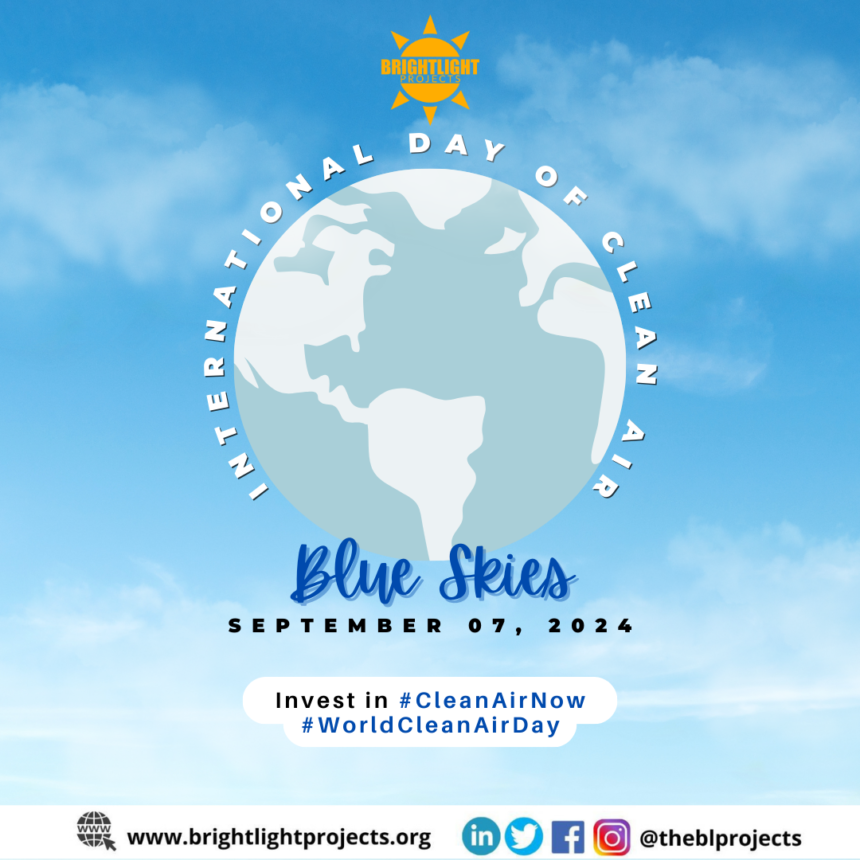The International Day of Clean Air for Blue Skies, celebrated annually on September 7th, serves as a crucial platform to highlight the importance of clean air and raise awareness about the devastating impacts of air pollution. This day is more than just a symbolic gesture; it plays a vital role in driving global action and inspiring change.
On the International Day of Clean Air for Blue Skies, we must acknowledge the critical link between clean air and realizing the Sustainable Development Goals (SDGs) and Africa’s Vision 2063. This day serves as a stark reminder of the urgency to tackle air pollution, a global crisis that disproportionately impacts developing countries around the globe. Identifying the impact of air pollution is crucial for the realization of clean air and promoting environmental sustainability and sustainable development.
Air pollution is a silent killer, leading to millions of premature deaths annually, primarily in low- and middle-income countries like those in Africa and the Asian Pacific. The impact extends far beyond health and includes the following;
Economically, air pollution leads to reduced productivity, increased healthcare costs, and damage to crops and infrastructure. This hinders economic growth and development.
Socially, it exacerbates inequalities, disproportionately affecting vulnerable groups like children, the elderly, and the poor.
Environmentally, air pollution contributes to climate change, exacerbates extreme weather events, and threatens biodiversity.
Investing in Clean Air as a Pathway to Sustainable Development
Investing in clean air solutions is not just a moral imperative, but a strategic necessity for achieving the SDGs and Africa’s Vision 2063. This requires a multi-pronged approach as examined in the subsequent paragraphs.
To begin with, strong Policies and Regulations are crucial in the realization of clean air for blue skies conducive to sustainable development. It can be said thus that stronger air quality regulations, including emission standards for vehicles, industries, and power plants will enhance the enjoyment of the right to a healthy environment.
Also, transitioning to clean and renewable energy sources like solar, wind, and hydropower is essential to reduce air pollution, given that it limits air pollution while promoting sustainable consumption patterns and sustainable development
Furthermore, Proper waste management practices, including reducing open burning, can significantly improve air quality. In the same light, promoting energy-efficient building design and construction practices can help reduce emissions and improve indoor air quality. Moreover, investing in research, education, and training programs to develop the necessary expertise and skills to implement clean air solutions and the Sharing of knowledge, technology, and financial resources to support clean air initiatives across the continent is very crucial in the realization of a clean and healthy environment where development strives.
Africa’s Vision 2063 and the Clean Air Imperative
Africa’s Vision 2063, a blueprint for a prosperous and sustainable future, recognizes the critical role of clean air in achieving its aspirations. The vision calls for an environmentally sustainable continent, with clean air, water, and energy resources. Investing in clean air solutions aligns perfectly with this vision, enabling Africa to: improve public health by reducing air pollution, Africa can protect its population from respiratory diseases and other health problems; Boost economic growth given that clean air can attract investment, improve productivity, and create new economic opportunities in sectors like renewable energy, clean technology, and environmental services. All in all, by promoting climate resilience through the tackling of air pollution, Africa can contribute to the global effort to combat climate change and build resilience against its impacts.
Conclusion
Investing in clean air is not just about protecting the environment, it is about building a more just, equitable, and prosperous future for all. By making clean air a top priority, Africa can create a legacy of healthy and sustainable development for generations to come. On this International Day of Clean Air, let us recommit ourselves to taking action and ensuring a future where everyone can breathe freely and thrive.

